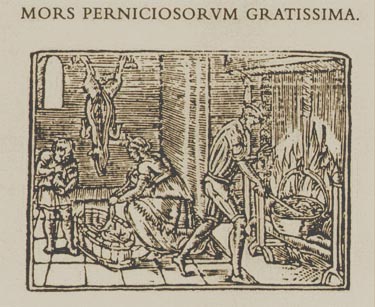

| Mors perniciosorum gratissima Bestia noxia sus, quae spes intercipit anni: Viua nocet tantum mortua tota iuuat. Ergo vbi mactatur brumali mense Decembri: Purpureamque animam guttura secta vomunt: Vir Mulier, Pueri impexi innuptaeque Puellae Conueniunt, gaudent, Laetaque flamma micat. Diuiditur corpus membratim, Otaria, Pernae, Cauda, caput, xenio distribuenda nouo. Flatilis in partem vesica venit puerorum. Caetera proficuis exta parata cibis. 10 Sic vbi quis perijt Epicuri de grege porcus: Cui Deus est venter: pro sale cui anima: Omnia qui viuus vertit sursum, atque deorsum: Congereret ventri quo male versa suo: Plauditur, et cunctis eius gratissima mors est: Qui vixit coeno deditus, atque gulae. Nam multi pascuntur eo, quo pinguit vnus. Cum corpus multis vnius interijt. Incipit et prodesse simul, cum desinit esse Ignauus viuens, mortuus vtilior. 20 |
The Death of a Nuisance -- Glad Tidings [tr. DK] The pig is a pernicious beast, ruining hoped harvests; it is, living, pure bane, but dead, every bit good, and so when it is slaughtered in wintry December spouting its purple lifeblood from its parted throat, men and women, unshorn boys and unmarried virgins come together and revel around the bright fire; the corpse diced up piecemeal, ears and hams, tail and head make fresh treats for the guests, the inflatable bladder passed on to the boys, and the rest of the entrails become wholesome meat. 10 So when out of the Epicure-herd some pig-follower dies, votary of his gullet, with soul good as dead whose lifework is to turn the whole world upside down and stash all of his ill-gotten gains in his gut, everyone cheers and welcomes the news of his death who lived wholly devoted to gorging and filth, for what he stuffed himself with keeps many alive once the body of one dies to benefit many and he starts to be helpful by ceasing to be, useless while he is living, and more useful dead. 20 |